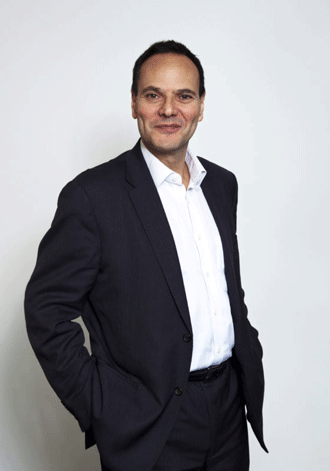
To many people’s surprise, Eric Salama announced at the end of 2019 that he would step down as CEO of Kantar. This was less than a year after he survived a near-fatal knife attack near his home in West London when a man tried to rob him.
Salama had earlier in 2019 engineered a majority stake sale of the WPP owned global market research company Kantar to Bain Capital Private Equity for US $4 billion. In announcing his intention to step down, he said: “After 17 years as chief executive now is the right time for me to pause, reflect on my personal priorities and explore other experiences.”
We catch up with Salama in London, following the announcement that he had just joined the board of Morning Consult, a global data intelligence company delivering insights on what people think, in real time. The board appointment follows the data intelligence company’s May announcement of a $31 million Series A funding round.
First of all, how are you doing during the COVID-19 pandemic?
It’s been a bit strange – some people have had a really difficult experience; I am lucky that I’m not one of them. I was on garden leave until the end of June so with that coinciding with COVID-19, I have been playing tennis, cooking and the house is tidier.
After leading Kantar to grow to one of the largest insights companies worldwide, why did you choose to become involved in Morning Consult?
I didn’t know what I was going to do when I left Kantar. I knew I had got the business to a good place and felt it was the right time to do something different so when I told the Bain Capital people at the end of November that I would be leaving, I didn’t have a plan, and I hadn’t met Morning Consult (MC). After I left Kantar in February, I started thinking about what it was I wanted to do, and I’ve ended up with a nice portfolio of different things that keep me engaged and gives me a bit more time for myself.
I haven’t joined the board of any other commercial organisations. I really like the MC people, their ambitions, their hunger and what they are doing so I guess it’s a combination of the people, the product and the company that drew me to them.
Does it help that it does not have legacy issues that you have to deal with?
Just to be clear I’m not running the organisation, I’m here to help but I think in every sphere of activity, not having a legacy sometimes makes things easier and at times much harder. It’s obviously easier from the point of view that you can introduce the technology that is the most leading-edge, you don’t need to worry about lots of different systems and you can start things without being encumbered by the past. However, you don’t have a lot of the relationships and history that would be helpful at times. In this current environment, where speed and agility are so important, you can see that start-ups do incredibly well in lots of different parts of the business world.
An ESOMAR study conducted earlier this year, forecast global turnover would fall by up to 22% for all research-related companies this year and 11% for research clients. What is your view on the prospects for 2020 and do you think the sector will bounce back in 2021?
COVID-19 is magnifying some of the differences that already exist, so you have clients that are growing their top line as they are in sectors that are doing well. If you look at Microsoft or Benckiser’s recent results, they are from two different sectors that are doing well. You’ve also got the hospitality sector or airlines that are having a really tough time, so you have category differences.
Within the research and insights sphere, there are buyers and sellers of research services with very different experiences. So the combination of clients and research services, and products being differentially affected means you have a huge spectrum, and if you add all of that together, you have the numbers that you mentioned. But within that overall picture, you are going to see some clients and categories increase spend and some providers doing incredibly well.
Some say that the pandemic has strengthened the hand of technology-enabled companies in the insights sector and accelerated the switch to online studies. Do you share this view?
Obviously, you have some markets like India that have been largely face-to-face and any activity that relies on physically engaging with respondents has had a tough time during this period. The acceleration is not just about online; it’s about quick time, quick turnaround, always-on, predictive research and solutions.
If I go back to my time at Kantar, we had clients that wanted faster, cheaper and better research but said ‘well we know we can’t get all of them’. Nowadays, clients want them all – speed is not just a means to an end, spend is an end in itself. Within organisations, the research and insights teams, the legal and HR teams, in fact, anyone who is in the business of analysing data needs to provide incredibly fast turnaround of that data to stay credible within that organisation. So speed and turnaround have become incredibly important, and COVID has accelerated that.
Does it mean that insights have to be more agile to enable clients to react in a more agile way?
Yes. It was happening pre COVID. Lots of clients would say “because of fast changes, I want to be able to make different types of decisions, and I need really agile, always-on, real-time solutions.” This has been magnified now because people are having to make decisions about marketing, sales, pricing, allocation and media issues and the world is changing very fast around them.
If KKR’s involvement with GfK forced it to pivot, and Norstat and CINT’s ownership by Triton and Nordic capital allows them to develop, and presumably Bain’s investment in Kantar will lead to greater digitisation, do you think the industry only evolve when outside capital is brought in?
It’s not appropriate for me to talk about Kantar since I left in February but certainly, I’m the person who led the spin-out of Kantar from WPP and the sale to Bain Capital and I still believe that I was right and that Kantar would do better outside WPP with an injection of capital, than inside.
There are lots of ways that you can get that capital, MC has got a particular way to raise money and Kantar has gone about it in a different way. But the industry as a whole is becoming more technology-led, technology investment costs money and you need it to be able to grow the business to be successful.
Out of all the new(er) technologies that have come on the insights market in the last five years, which ones excite you the most and why?
There are lots of good platforms and engagement services with customers, but I think the one that is potentially the most interesting but has still to really prove its worth is machine learning and AI. I’ve seen lots of good applications but it still hasn’t revolutionised the way the sector does things. But I think the potential is there.
Do you think it is time for the sector to retool and rethink given the increasing role of the consulting sector in the insights domain?
One of the things I like about MC is that it sits in a space between what governmental organisations need and what corporates need, and I think that one of the things that is happening is that there is a blurring of lines. Some of the insights information that is needed now differs from what was needed before. It’s not just about consulting. If you look at it from a clients’ point of view, they need insights but much more holistic ones, in real time, a mixture of behavioural and attitudinal data, at scale and around the world, and they need to embed it in what they are doing. They need analytics because it’s not just about new data that they are collecting. Consulting is just one of the new players, and clients need a hybrid of a lot of capabilities that were previously in siloes.
At Kantar, you laid major emphasis on the role of great talent. Do you feel confident in the degree to which great talent is being recruited into the sector and what do you feel about the level of training that entrants receive in general?
Training encompasses a range of activities. Some of it is on the job training, some of it is mentoring, so it’s not just formal training that’s needed but genuine interest in people, helping them and giving them feedback. You are right to ask the question since there is a danger that the industry doesn’t develop people because it’s trying to do so many things so fast and with no resource
I put a huge emphasis on diversity and inclusion at Kantar, and that’s partly about tapping into new talent pools that the industry didn’t normally tap into and enabling talented people to really flourish. To my mind, thinking about it as just training is too restrictive, it’s about doing everything that needs to be done to help talented people to develop their careers, to learn and do well and be more impactful. And that is a huge need not just in the insights industry but across the board.
Are we attracting the right people? I think it’s easier for technology companies to attract some of those people because they are perceived to be digital and innovative, and everyone wants to work in environments that they feel are growing and leading-edge. Culture is also key to bring in people who are tech-minded, and there is a lot more competition for these people than ever before.
We need different types of people and more diverse talent, so it is about what business a company is in, and companies that also have a good culture will be able to attract talented people. It requires work, and I don’t think anyone should underestimate how much it takes to build a great culture.
There’s been a lot of attention on racial discrimination recently, and lack of equality, and it looks like the insights sector is not the most diverse. It would also appear that women receive lower pay for doing equivalent jobs. How do you suggest we go about tackling this?
In the case of women, the majority of the industry is female, and there is incredible talent. The issue for the sector to address is how to enable women to progress and be successful, and earn as much as, or more, than men. And for that to come about, a whole load of things needs to happen. It’s about men recognising the impact of their behaviour and making sure that companies really promote talented women into more senior positions. r positions.
I don’t quite agree with what you said about women being paid less for equivalent jobs – It’s more complex and nuanced. I think women as a whole get paid less than men in the industry largely because there aren’t as many women in senior positions so promoting women to senior roles is essential as is really advocating for talented women.
On the race side, I think it is a different set of issues. The industry doesn’t attract enough diverse and local people in many markets. The industry needs to actively market itself to different types of talent to bring people in and to help them be successful. There isn’t enough diversity in the sector, and that hurts the industry as it means it isn’t as creative as it could be as creativity comes from having different perspectives and having different backgrounds. So as a sector we lose out by not having a diverse group of people. It’s not just a moral issue, it’s an economic issue as the industry would grow faster if it had more diverse talent and it is that melting pot that is so essential to the insights industry.
Is it an image issue or a lack of appreciation about the sector and what it does?
It’s not just the research and insights sector. If you look at advertising, there aren’t as many diverse people as there need to be so marketing, in general, has not done a good job of making itself attractive and needs to improve. Clearly, you have lots of incredibly talented creative people turning to other parts of the creative industry but not going in numbers into marketing.
Do you think it’s because they feel that they are not welcome?
I think there is a lot to do with role modelling. I have a huge amount of time and respect for Karen Blackett who leads the WPP business in the UK and is one of the most senior female people in the industry and an incredible role model. By what she does and how she leads, she attracts more diverse talent into the industry.
It’s really important that people can look at their companies and see people who look like them, who get them and who they feel close to.
You have also just taken up the role as chair of the board of trustees at Comic Relief and are also a Senior Fellow of the John F Kennedy School of Government at Harvard University. Are there any other areas of interest that you would still like to explore?
MC has exceeded my expectations as I love their energy and ambition, and they are a great group of people to work with. So I haven’t got anything else to announce right now.


